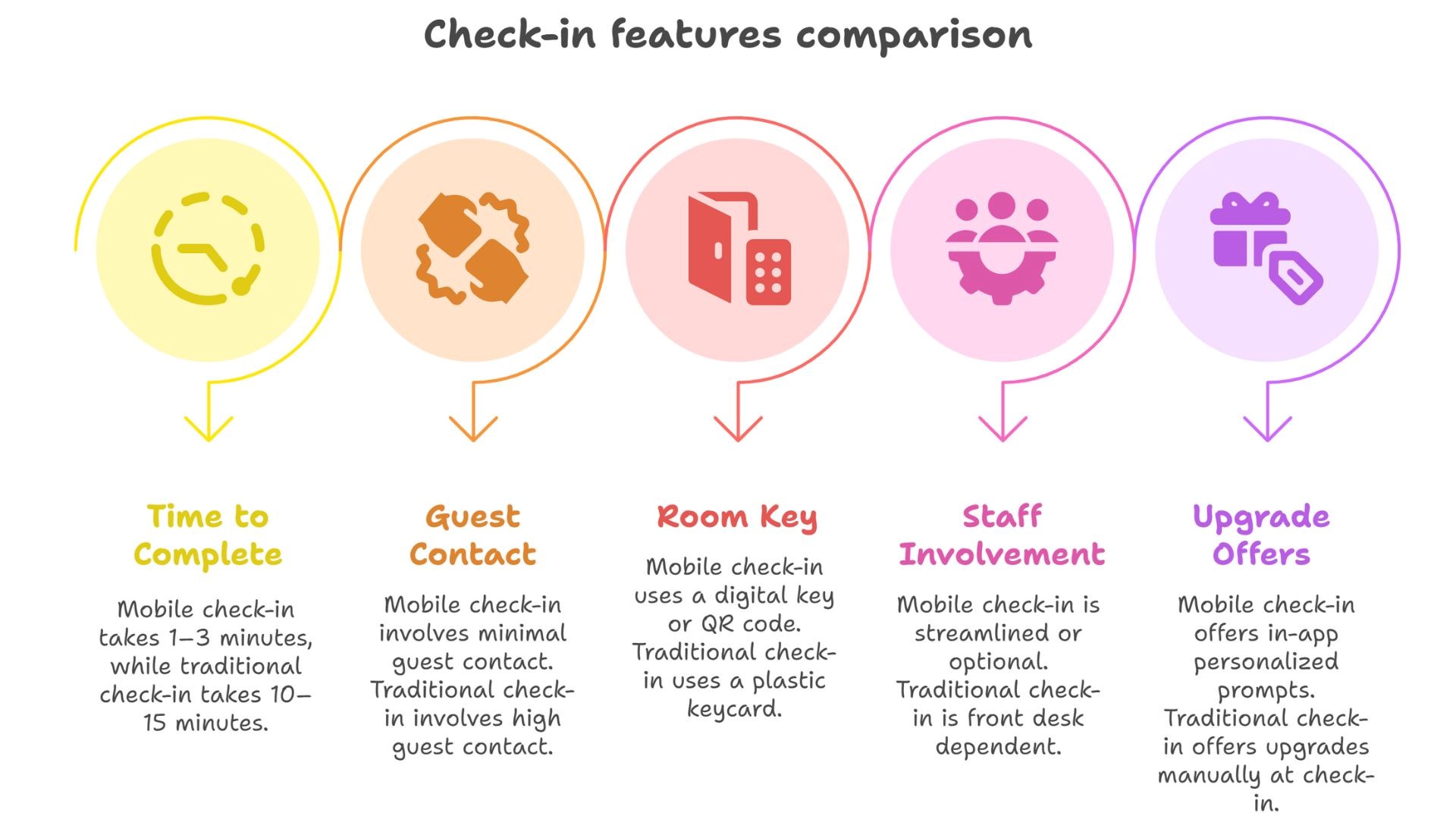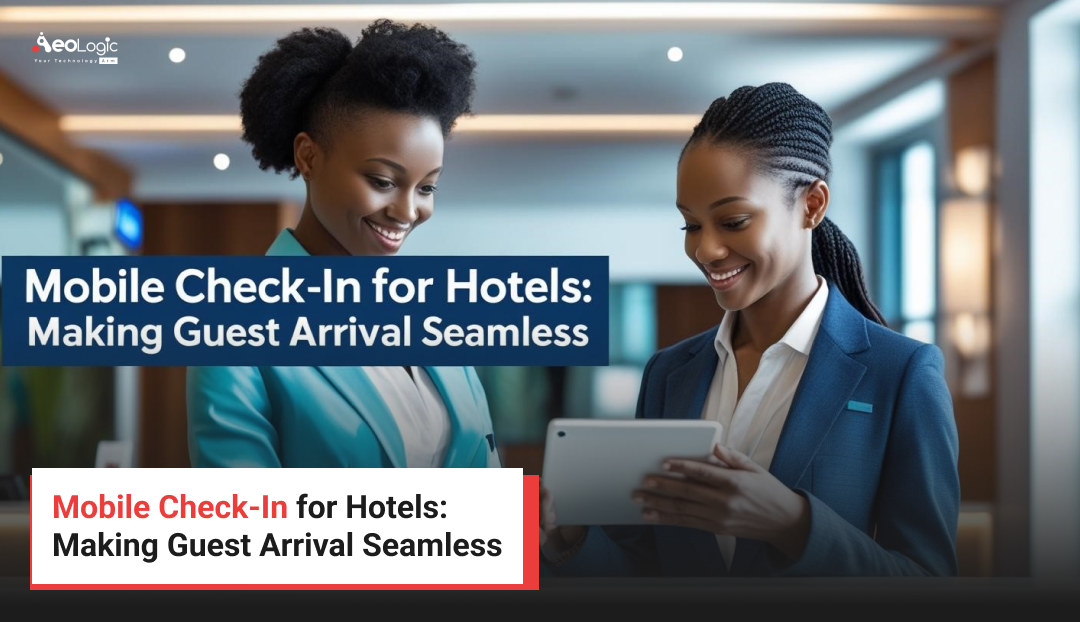Hospitality’s New First Impression
Something interesting is happening in hotel lobbies across the world. The familiar sight of guests lining up at reception desks is gradually disappearing. Instead, travelers are pulling out their phones as they walk through the doors, bypassing the queue entirely. It just about technology,it’s about changing what guests expect from their first moments at a hotel.
We’ve moved well beyond the days when mobile check-in for hotels was just a pandemic workaround. Today, it’s become something much more significant: a powerful tool that changes how hotels operate and how guests experience their stays. The best properties aren’t just adopting this technology—they’re using it to create meaningful advantages.
What Is Mobile Check-In and Why Does It Matter?
Mobile check-in technology is making a huge impact on the reception desk experience. Every necessary step in arriving is conducted by guests using their own devices—everything from booking confirmation to payment completion, booking a night for the seventh time—guests are able to complete the necessary steps in the check-in process using a hotel’s specially designed mobile app or mobile-compatible website enabling customers to electronically submit identification, authorize payment, and activate digital room keys (often, before they physically even arrive at the property).
In addition to these features, hotel services are now incorporated into transactional touchpoints. Guests initiate requests for services and amenities, place food orders, and book spa appointments using an application/website that also electronically manages tasks booked elsewhere in the native application. Guests have the opportunity to use a wide variety of services for customization—room upgrades, schedule changes, etc., before they arrive at the hotel. Integrated messaging allows guests to communicate with hotel staff to get immediate responses and real-time updates on things like room availability or local attractions—further expanding access to hotel staff and their services.
What is actually happening? The past speed of check-in no longer matters, but how the entire guest experience has been redefined. Friction is removed while upholding control with the traveler, allowing for interactions that are nearly effortless but enjoyable, yet meaningful; these are the types of interactions modern guests are looking for—they want their service providers to make the mundane beautiful. All of this lays the groundwork for service that is more personalized and operations that are more responsive and authentic; and all of this is increasingly seen as vital for hospitality brands leading the way for the future
Why Mobile Check-In Matters
Travelers today expect convenience, but mobile check-in for hotels isn’t just about convenience. Hotels can use mobile check-in for hotels to improve the guest experience and address operational issues that have plagued the industry for decades.
Faster Arrival, Happier Guests
Nobody wants to wait in a line to check in after a long journey. Mobile check-in provides a mechanism for guests to avoid a lobby check-in and arrive at their rooms in less than three minutes. A report referenced in Moldstud‘s article summarizes the impact mobile check-in has on the guest experience, reducing the wait time to check in by as much as 70%.
Hotels win by not having to busily crowd the lobby and permitting staff to focus on the guests, not the paper work.
A Safer, More Modern Experience
The pandemic has created travelers who prefer to limit contact with shared surfaces and people. Mobile check-in meets that criteria. In fact, Hotelier Magazine reported that the majority of guests prefer some form of contactless options as standard fare in a hotel.
The digital, touch-free entry process that mobile check-in for hotels offers is no longer an upgrade, but a minimum expectation of the guests.
Smarter Use of Hotel Staff
Moving standard check-in tasks to mobile apps allows hotels to reassign the front desk team to higher value interactions. Rather than printing forms, or cutting keycards, front desk employees can welcome an important guest, handle situation, or assist with concierge requests. According to Hotel News Resource, now they can reconnect and engage with guests and use their time more efficiently.
Control in the Hands of Guests
Guests love having options, and mobile check-in for hotels provides that. Whether they’re picking a specific room, or just deciding when to arrive, giving guests control in their experience can offer a level of comfort they crave. Some apps even provide a floorplan, or available rooms for upgrade options that can make the experience feel less transactional and more personal.
In a 2023 article by InnQuest, the author noted that hotels offering the chance for this type of choice experienced an increase in quality reviews and visitation recurrence.
Better Business, Too
There is a different side to this convenience option—there are financially viable aspects to it. Mobile apps offer opportunities for hotels to position room upgrade options, spa experiences, or late checkout offers at a time that is more targeted than before. In a campaign tracked by MMA Globalover six months, the in-app upsell prompts drove per-guest spend.
With all interactions happening digitally, hotels have tremendous insights into guest preferences and behaviors.
What Hilton Did Right
Hilton’s mobile strategy shows what’s possible when tech meets guest needs. By integrating mobile check-in and room selection into the Hilton Honors app, the brand saw a 20% improvement in satisfaction scores. Travelers loved the smooth arrival experience and the option to skip the front desk entirely.
You can find user stories and feedback on forums like Reddit or review summaries in Hotelier Magazine, where frequent travelers often praise the control and speed Hilton’s system provides.
Digital Check-In and the Rise of Self-Service Hospitality
Digital check-in has evolved far beyond just skipping the front desk—it’s now a key feature of hotel self-service ecosystems. These platforms, usually housed within mobile apps, give guests the ability to manage their stay from their phone, start to finish.
From unlocking the room with a digital key to ordering room service or booking a last-minute massage, modern hotel apps bring everything together in one place. It’s all about putting control in the guest’s hands while reducing friction across the journey.
What Can Guests Do with a Self-Service App?
Many of today’s hotel apps go well beyond basic functionality. Common features include:
Digital Room Access – No need to carry (or lose) a keycard.
One-Tap Upgrades – See available rooms and choose a better view or layout.
In-App Concierge Chat – Get restaurant recommendations or order extra pillows without dialing.
Instant Reservations – Book dining tables, spa appointments, or activities with ease.
Contact-Free Payments – Settle bills or check out without stopping by the front desk.
In short, the app becomes a pocket concierge, front desk, and guest service hub.
Why Hotels Are Investing in Self-Service
Hotel apps aren’t just for convenience—they’re strategic tools. Here’s what they help hotels achieve:
1. More Revenue Through Upselling
Push notifications for add-ons like breakfast, late check-out, or room upgrades reach guests when they’re most likely to purchase. In one Revfine case study, hotels that implemented targeted in-app promotions reported a 30% increase in ancillary revenue.
2. Faster Response Times
Requests submitted through the app—like asking for fresh towels or fixing a thermostat—go directly to the right department. This shortens response times and reduces miscommunication.
3. Personalized Stays
Because these apps track guest preferences and behavior, hotels can tailor future stays. Think preset room temperatures, preferred pillows, or curated local experiences—all based on past data.
A 2024 article from Hospitality Net notes that personalization increases guest satisfaction by over 25% when done through app-based systems.
Case in Point: The Marriott Bonvoy App
Marriott’s Bonvoy App is a strong example of self-service done right. Guests can check in before arrival, use their phone as a room key, make requests during their stay, and even skip the checkout desk entirely.
In a press release, Marriott highlighted that app users had higher loyalty engagement, spent more on property, and reported fewer service complaints. For staff, the app helped reduce inbound calls and freed up teams to focus on meaningful guest interactions.
The Bigger Picture
For both guests and hotels, self-service apps create a smoother, smarter experience. Travelers enjoy more freedom and personalization, while hotels gain efficiency and increased revenue. As digital expectations rise, investing in user-friendly apps isn’t optional—it’s the new standard.
Smart Hospitality: The Role of QR-Based Services
QR codes have quickly moved from trendy tech to operational necessity in the hospitality space. As part of the digital transformation, these simple scan-and-go tools are reshaping how guests interact with hotel services—minimizing physical contact while maximizing convenience.
Instead of waiting in line or calling the front desk, guests can scan strategically placed QR codes to unlock instant access to hotel offerings. These codes aren’t just functional—they’re frictionless gateways to a more modern guest journey.
How Hotels Are Using QR Codes Today
From arrival to checkout, QR technology is embedded throughout the guest experience:
Seamless Room Access
Guests scan a code on their mobile device to unlock their rooms—no keycards or front desk needed.
Concierge at Your Fingertips
A quick scan connects guests to a digital concierge to request room cleaning, fresh towels, or luggage assistance.
Interactive Menus
Whether poolside or in-room, guests can browse QR based’s restaurant menus and place orders via QR-enabled systems.
Spa & Wellness Bookings
Booking a QR Based’s massage or gym session is as easy as scanning a QR code outside the wellness center.
Explore the City
Many properties use QR signage to offer digital maps, local guides, or curated itineraries—especially useful for international travelers.
These innovations not only increase guest satisfaction, they also reduce staffing strain and printing costs.
According to a 2023 report by Skift, 78% of hotels that implemented QR-based services saw a notable drop in service response times and a rise in positive guest feedback.
Modern vs. Traditional Check-In: A Quick Comparison
The shift to mobile check-in isn’t just a matter of preferenceit’s a strategic upgrade. Here’s how it stacks up against the conventional approach:
With mobile check-in, guests gain speed and control,while staff are free to focus on creating meaningful interactions, not just transactions.

Why Hotels Are Embracing Mobile Tech: Key Business Advantages
Digital check-in and QR-based tools aren’t just about guest convenience—they’re smart business decisions that impact a hotel’s bottom line, efficiency, and brand image.
1. Cost Efficiency with Scalable Impact
Automating check-in reduces the need for large front desk teams.
Going paperless saves on printing costs and eliminates the need for disposable plastic keys.
Faster guest processing leads to quicker room turnover and better housekeeping scheduling.
Hotels using mobile-first platforms reported up to 30% cost savings on front desk operations (Hospitality Tech, 2023).
2. Smarter Guest Intelligence
Every tap and scan creates valuable behavioral data.
Patterns reveal which services guests use most, when they prefer to check in, and which offers convert best.
This insight enables data-driven decisions—from personalized marketing to staffing levels.
A study by Oracle Hospitality found that 72% of hoteliers who used guest data from mobile systems increased repeat booking rates within one year.
3. Elevated Brand Perception
Digital-forward services appeal to modern travelers who expect tech-enabled experiences.
Hotels that offer mobile check-in and QR services often score higher on OTA reviews and guest surveys.
A seamless tech experience also drives loyalty program adoption and app downloads.
Hotels rated as “tech-friendly” were 2.4x more likely to receive 5-star guest reviews, according to a 2024 Guestcentric report.
Real-World Applications: Boutique Hotels vs. Large Chains
The implementation of mobile check-in solutions varies depending on hotel type, but both boutique and chain properties are leveraging the technology for impactful results.
Boutique Hotel Example:
A luxury boutique property integrated a mobile app with QR code room access and a digital concierge that features custom local guides, restaurant recommendations, and event alerts. The result? A 25% increase in direct bookings, driven by guests valuing the personalized, tech-forward experience.
Chain Hotel Example:
A global hotel chain enhanced its loyalty app with features like automatic check-in based on past visit data and synced guest preferences. By removing repetitive admin tasks, the front desk workload dropped by 40%, enabling staff to focus on high-value interactions.
Forward-Looking Insight:
As smaller properties become more agile in deploying lightweight mobile solutions and larger brands enhance app ecosystems with AI and predictive behavior tools, the mobile experience is set to become even more personalized.
Potential Limitations:
Boutique hotels may struggle with upfront investment in tech infrastructure.
Chain hotels face slower rollout across global locations due to standardization and legacy system challenges.
Reference: Skift – How Mobile Tech Boosts Direct Bookings in Boutique Hotels
Reference: Hilton Honors App Performance Report
What Guests Will Expect by 2025
Hospitality is rapidly becoming a digital-first industry. By 2025, guest expectations are evolving from “nice-to-have” conveniences to standard requirements:
Speed as a Standard: Guests will expect to check in within three minutes or less.
Full Control: Ability to choose rooms, upgrade, and manage preferences before arrival.
Privacy Matters: Minimal staff interaction is now equated with respect and efficiency.
Miss the Mark, Risk the Guest:
Failure to meet these digital expectations could result in negative reviews, diminished brand trust, and declining loyalty—especially from younger, tech-savvy travelers.
Future Forecast:
Hotels will likely implement AI concierge agents that personalize the experience in real time, allowing for automated room suggestions and tailored local offers before check-in is even complete.
Safeguarding Digital Check-In: Security and Privacy Measures
The growing reliance on digital systems makes robust security protocols non-negotiable. Here’s how leading hotels are keeping guest data safe:
Core Protocols:
- Data Encryption: Ensures secure information transmission between app and hotel servers.
- Bluetooth Low Energy (BLE) Keys: Reduces vulnerability compared to traditional magnetic stripe cards.
- Frequent Security Audits: Identifies vulnerabilities and strengthens systems.
- Regulatory Adherence: Compliance with GDPR, PCI DSS, and regional data laws is a must.
Example in Practice:
A well-known European hotel group anonymizes mobile check-in data after 90 days, aligning with EU regulations and earning high trust scores in guest surveys.
Emerging Risk Factors:
Device loss or hacking remains a concern.
Hotels must be vigilant against phishing or fraudulent booking attempts.
Reference: European Hotel Privacy Report – Anonymization Standards
The Tech Horizon: Innovations Reshaping Mobile Check-In
Future-forward hospitality brands are exploring how new tech can create smarter and more delightful guest interactions:
What’s Coming:
Facial Recognition Check-In: Enables identity verification without documents or devices.
Smart Room Sync: Adjusts lighting, temperature, and music based on guest profile at check-in.
Voice-Controlled Arrival: Guests could soon check in using Alexa or Google Assistant.
Blockchain for ID: A secure, decentralized way to confirm identity across hotel networks.
Future Opportunities:
Personal AI travel agents integrated into hotel apps.
Predictive hospitality services based on past travel behaviors.
Limitations to Consider:
High implementation costs for smaller properties.
Regulatory and ethical concerns around biometric and blockchain data use.
Reference: Forbes – The Future of Hotel Tech: What’s Next in 2025
Key Strategies for Effective Mobile Check-In Deployment
To successfully implement mobile check-in systems that are embraced by both guests and staff, hoteliers should follow these best practices:
Invest in Team Training
Make sure staff know how to troubleshoot mobile tools and guide guests using them.
Promote Mobile Early and Often
Include mobile check-in options in booking confirmations, reminders, and welcome emails.
Keep Traditional Paths Open
A hybrid system respects guest preferences—whether digital or in-person.
Refine App Experience Continuously
UX matters—apps should be intuitive, fast, and bug-free across devices.
Solicit and Act on Feedback
Use guest input to refine the experience and add features that matter.
Pro Tip:
Don’t just implement technology, embed it within the brand’s service culture for maximum impact.
Final Takeaway: Redefining Guest Arrival in the Digital Era
Mobile check-in isn’t just a tech upgrade—it’s a strategic move that reflects the modern guest’s values: speed, control, and convenience. Hotels that embrace this shift will gain more than operational efficiency—they’ll earn trust, loyalty, and a reputation for innovation.
Looking Ahead:
As AI, voice tech, and personalization continue to evolve, mobile check-in for hotels will be just the beginning of a fully integrated digital guest journey. Hospitality is becoming predictive, not just reactive—and hotels that lead this change will define the future of guest experience.
With Aeologic Technologies as your trusted tech solution partner, you can leverage cutting edge AI innovations to transform your contact center operations. The gen AI financial services are just beyond our imagination and have a brighter future than today. This not only improves the way of contact services but also introduces an innovation that is going to enhance the financial sector for a long time.
Enhance enterprise productivity by partnering with a mobile application development company Noida skilled in building integrated mobile platforms for workforce, operations, and customer engagement.
Frequently Asked Questions
Q: What if a guest prefers a personal touch at check-in?
A: Offer both options. Mobile and traditional systems can—and should—coexist.
Q: Is mobile check-in for hotels compatible with older PMS systems?
A: Yes, with the right integration layer or middleware, even legacy systems can support mobile check-in.
Q: Will mobile check-in pay off?
A: Most hotels recoup their investment in 12–18 months through savings on staff, keycards, and enhanced upselling.

With a strong foundation in software and a growing expertise in AI, I specialize in building smart, scalable solutions that drive digital transformation






